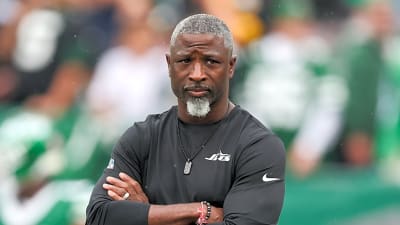- Home
- Quizzes
- My Quiz Activity
- Newsletters
- MY FAVORITES
- Add Sports/Teams
- SPORTS
-
NFL
- NFL Home
- Arizona Cardinals
- Atlanta Falcons
- Baltimore Ravens
- Buffalo Bills
- Carolina Panthers
- Chicago Bears
- Cincinnati Bengals
- Cleveland Browns
- Dallas Cowboys
- Denver Broncos
- Detroit Lions
- Green Bay Packers
- Houston Texans
- Indianapolis Colts
- Jacksonville Jaguars
- Kansas City Chiefs
- Las Vegas Raiders
- Los Angeles Chargers
- Los Angeles Rams
- Miami Dolphins
- Minnesota Vikings
- New England Patriots
- New Orleans Saints
- New York Jets
- New York Giants
- Philadelphia Eagles
- Pittsburgh Steelers
- San Francisco 49ers
- Seattle Seahawks
- Tampa Bay Buccaneers
- Tennessee Titans
- Washington Commanders
-
MLB
- MLB Home
- Athletics
- Arizona Diamondbacks
- Atlanta Braves
- Baltimore Orioles
- Boston Red Sox
- Chicago White Sox
- Chicago Cubs
- Cincinnati Reds
- Cleveland Guardians
- Colorado Rockies
- Detroit Tigers
- Houston Astros
- Kansas City Royals
- Los Angeles Angels
- Los Angeles Dodgers
- Miami Marlins
- Milwaukee Brewers
- Minnesota Twins
- New York Yankees
- New York Mets
- Philadelphia Phillies
- Pittsburgh Pirates
- San Diego Padres
- San Francisco Giants
- Seattle Mariners
- St. Louis Cardinals
- Tampa Bay Rays
- Texas Rangers
- Toronto Blue Jays
- Washington Nationals
-
NBA
- NBA Home
- Atlanta Hawks
- Boston Celtics
- Brooklyn Nets
- Charlotte Hornets
- Chicago Bulls
- Cleveland Cavaliers
- Dallas Mavericks
- Denver Nuggets
- Detroit Pistons
- Golden State Warriors
- Houston Rockets
- Indiana Pacers
- Los Angeles Clippers
- Los Angeles Lakers
- Memphis Grizzlies
- Miami Heat
- Milwaukee Bucks
- Minnesota Timberwolves
- New Orleans Pelicans
- New York Knicks
- Oklahoma City Thunder
- Orlando Magic
- Philadelphia 76ers
- Phoenix Suns
- Portland Trail Blazers
- Sacramento Kings
- San Antonio Spurs
- Toronto Raptors
- Utah Jazz
- Washington Wizards
-
NHL
- NHL Home
- Anaheim Ducks
- Boston Bruins
- Buffalo Sabres
- Calgary Flames
- Carolina Hurricanes
- Chicago Blackhawks
- Colorado Avalanche
- Columbus Blue Jackets
- Dallas Stars
- Detroit Red Wings
- Edmonton Oilers
- Florida Panthers
- Los Angeles Kings
- Minnesota Wild
- Montreal Canadiens
- Nashville Predators
- New Jersey Devils
- New York Islanders
- New York Rangers
- Ottawa Senators
- Philadelphia Flyers
- Pittsburgh Penguins
- San Jose Sharks
- Seattle Kraken
- St. Louis Blues
- Tampa Bay Lightning
- Toronto Maple Leafs
- Utah Mammoth
- Vancouver Canucks
- Vegas Golden Knights
- Washington Capitals
- Winnipeg Jets
- NCAAF
- NCAAM
- Olympics
- Boxing
- Entertainment
- Lifestyle
- Golf
- MMA
- Soccer
- Tennis
- Wrestling
- Sports Betting
- More Sports
- RESOURCES
- My Account
- YB on Facebook
- YB on Twitter
- YB on Flipboard
- Contact Us
- Privacy Policy
- Terms of Service
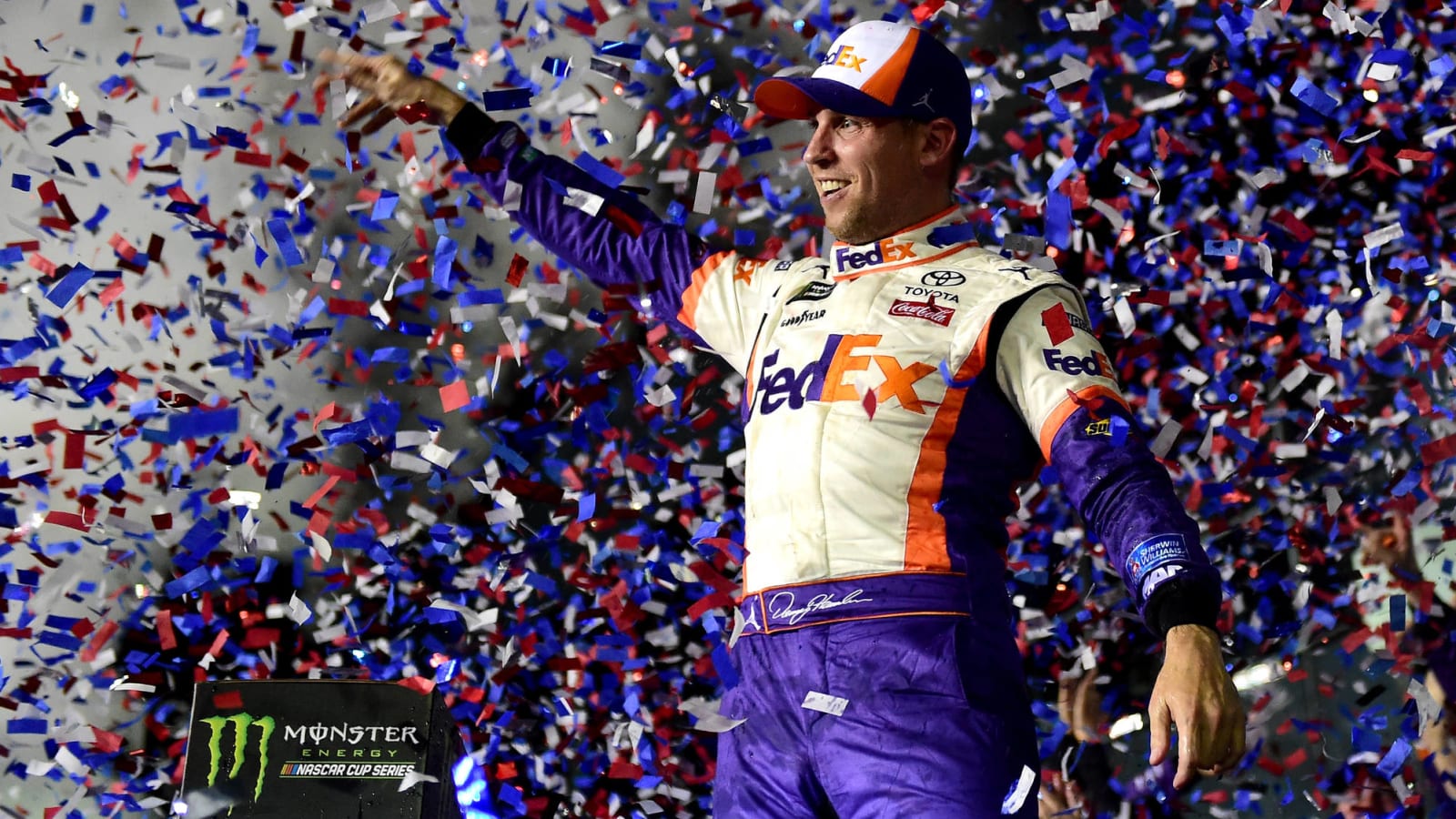
Who won the Daytona 500 winner the year you were born?
This year will be the 62nd annual installment of the Daytona 500, the 200-lap, 500-mile race that is the most important, prestigious and lucrative in all of NASCAR. As you may recall, Denny Hamlin won the event last year, but how about the 60 years before that? Take a trip through the Daytona 500’s history, check out who won the year you were born (as long as you were born in 1959 or afterward) and get your engines ready for Sunday, Feb. 16, 2020!
2019: Denny Hamlin
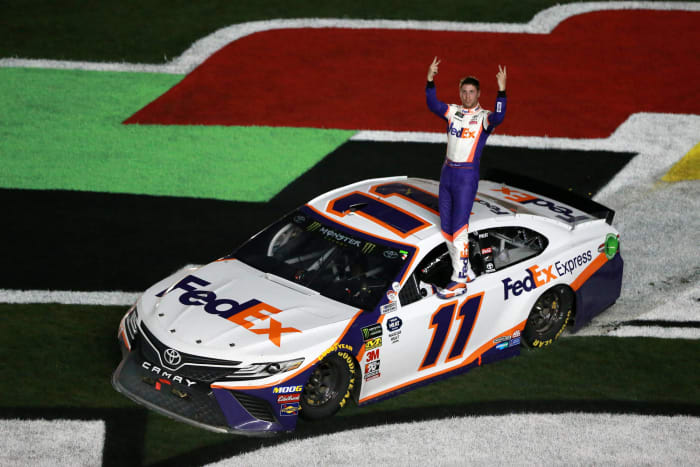
If you were born in 2019, either this article is old or you are reading at an advanced level for your age. Either way, congratulations are in order for someone! At the 2019 Daytona 500, congratulations were extended to Denny Hamlin for winning the race for the second time in his career. Only 14 cars completed the race in its entirety due to lots of late eliminations, giving Hamlin an opportunity to emerge from the 12th position and capture the Harley J. Earl Trophy.
2018: Austin Dillon
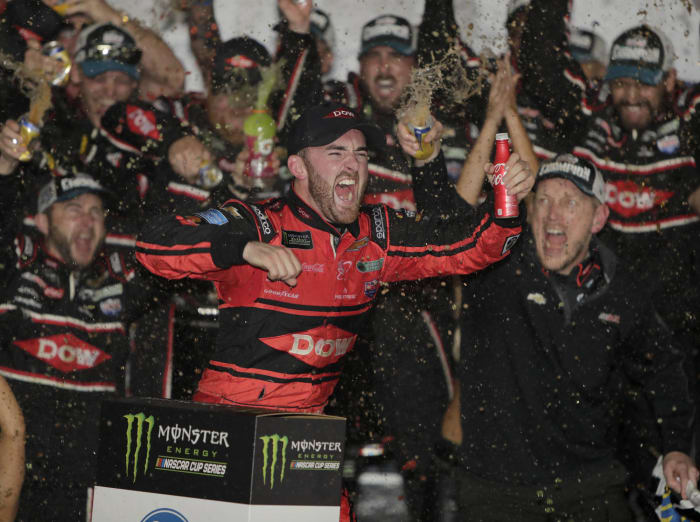
Three big wrecks wreaked havoc on the 2018 Daytona 500 and eliminated several top drivers, but Austin Dillon managed to avoid the melee and steer his car from the 14th position to first place for his first-ever win. Dillon drove a No. 3 Chevy for Richard Childress Racing and won exactly 20 years after Dale Earnhardt also won for the first time at Daytona in a Chevy with the No. 3 for Richard Childress Racing.
2017: Kurt Busch

Kurt Busch won the Daytona 500 for the first time, in 2017, the first year the season went by the name Monster Energy NASCAR Cup Series. Jeffrey Earnhardt (great-grandson of Ralph Earnhardt) also became the first fourth-generation driver to ever compete in the event. That's it for firsts, but in seconds, it was the second time in a row that the winning driver drove a Toyota (the second win ever for the automaker), came from Joe Gibbs Racing and started from the 11th position.
2016: Denny Hamlin

The 2016 Daytona 500 began with No. 11 Denny Hamlin in 11th position, but Hamlin nevertheless managed to finish in first place for his first Daytona win, the first-ever win for a Toyota and the second victory in the event's history for Joe Gibbs Racing (and the first in 23 years). It was also Hamlin’s 27th career Sprint Cup win.
2015: Joey Logano
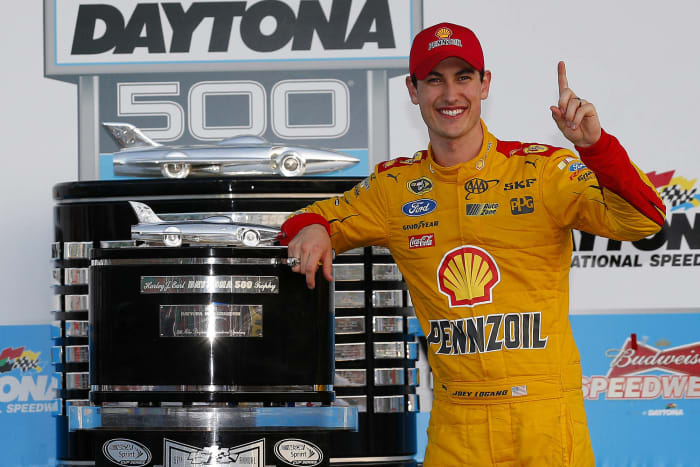
Jeff Gordon earned pole position in his 23rd and final career Daytona 500 start, but his storybook-ending hopes were extinguished after a final-lap pileup collected him, A.J. Allmendinger, Trevor Bayne, Reed Sorenson and Ricky Stenhouse Jr. Instead, it was 24-year-old Joey Logano who drove to Victory Lane in the end, becoming the second-youngest driver to ever win at Daytona.
2014: Dale Earnhardt Jr.

The 2014 Daytona 500 holds the unique but unfortunate distinction of owning the longest rain delay in the race’s history: six hours and 22 minutes. It didn’t restart until almost 9 p.m. local time and didn’t conclude until late that night with Dale Earnhardt Jr. holding off Denny Hamlin for his second victory at Daytona. Three of the top five finishers (Earnhardt, Jeff Gordon and Jimmie Johnson) were members of the Hendrick Motorsports team.
2013: Jimmie Johnson
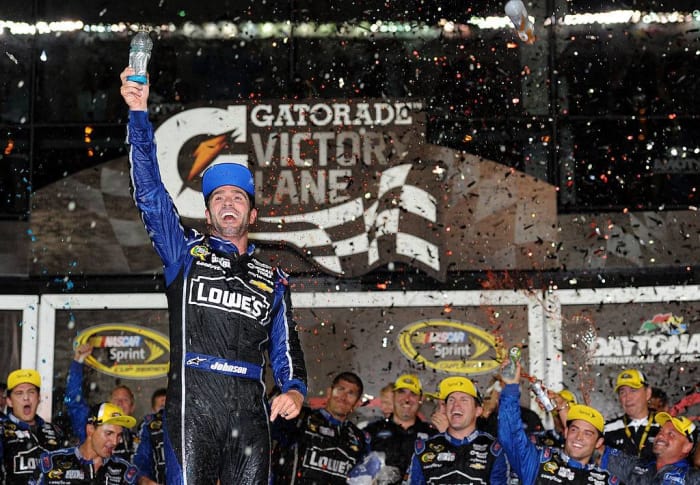
Although Danica Patrick received a lot of attention at the 2013 Daytona 500 for being the first female to earn pole position and having the best-ever finish by a woman (eighth place), the day belonged to Jimmie Johnson. This was Johnson's 400th Sprint Cup start, and he held the lead for the last 10 laps (while fending off late charges by Dale Earnhardt Jr. and Mark Martin) for the second Daytona victory of his career.
2012: Matt Kenseth
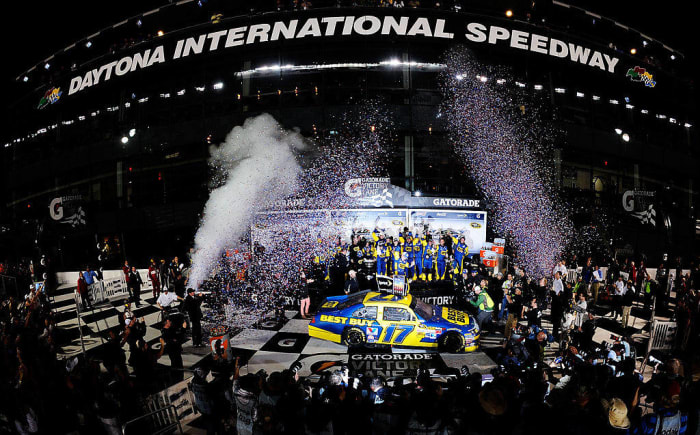
Aside from being Matt Kenseth’s second victory at the track, the 2012 Daytona 500 was memorable for two major delays. First, due to weather, it was the only Daytona event to be pushed back an entire day, starting on Feb. 28 instead of Feb. 27. The second delay occurred during a lap 160 caution when Juan Pablo Montoya lost control of his car on a straightaway and ran into the back of the jet dryer truck. This led to an explosion and a large fire and caused fuel to spill across the track, resulting in a two-hour delay. Thankfully, there were no serious injuries.
2011: Trevor Bayne

The 2011 Daytona 500 had a record 16 cautions and 74 lead changes involving 22 drivers over four hours, but when all was said and done, Trevor Bayne was the winner. At only 20 years old, Bayne became the youngest driver to ever win at Daytona, which was only the second Cup race of his young career. “It’s crazy to get my first win before a Nationwide win,” Bayne later said. “I didn’t know how to get to Victory Lane."
2010: Jamie McMurray
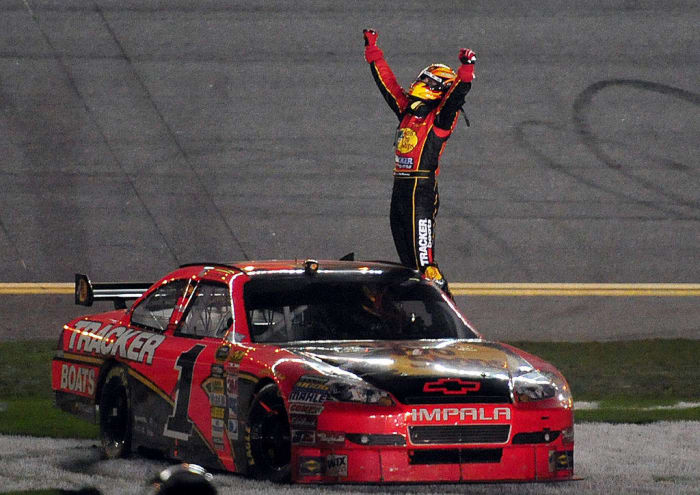
Jamie McMurray drove the No. 1 car for the 2010 Daytona 500 and finished in the No. 1 spot for his first victory at the event. Although there were numerous cautions and the race took three hours and 47 minutes — finishing under the lights as the longest Daytona 500 at the time — there was no big crash, and the largest wreck involved only six cars.
2009: Matt Kenseth
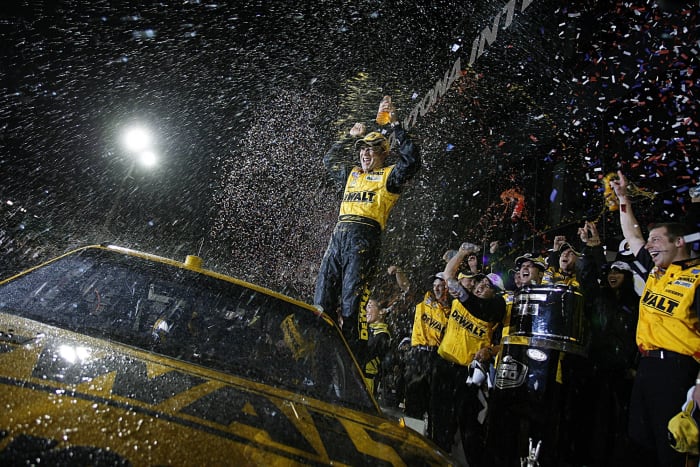
After a winless 2008 season, Matt Kenseth won the rain-shortened 2009 Daytona 500 after 152 laps. This race was also notable for an incident on lap 124 where Dale Earnhardt Jr. was blocked by Brian Vickers and responded by spinning his opponent into traffic and wrecking the field. Most viewers saw this as Dale intentionally causing the big one, and he was penalized and later made a public apology for his actions.
2008: Ryan Newman
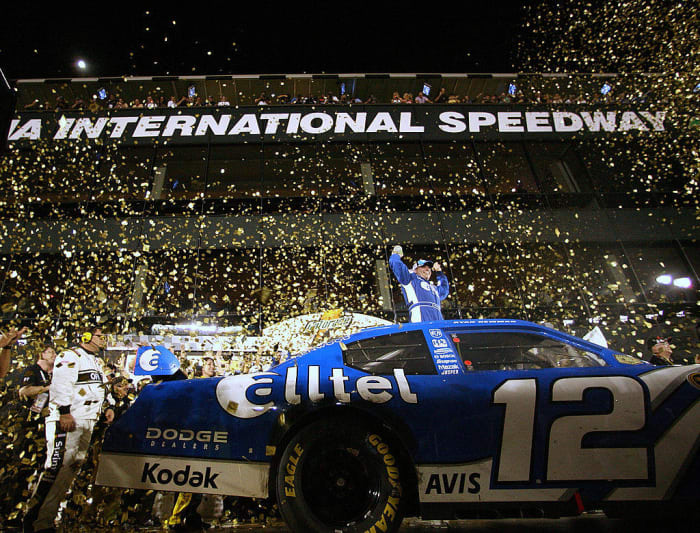
The 2008 Daytona 500 marked the 50th installment of the race and the first and only victory for Ryan Newman. In fact, it was actually the only race Newman won all season. In other firsts, it was the first win for Penske Racing and the first Daytona 500 using NASCAR’s Car of Tomorrow. At the race’s finale, it was Tony Stewart, Kyle Busch, Kurt Busch and Ryan Newman all battling for first place before Kurt pushed Newman, his teammate, to victory.
2007: Kevin Harvick

With only one lap to go in the 2007 Daytona 500, it was Mark Martin, Kyle Busch and Kevin Harvick leading a single-file pack. Busch, in an attempt to simultaneously pass Martin and block Harvick, ended up getting loose and wiped out many of the cars behind him, leaving only Martin and Harvick to vie for first place. In the end, Harvick won by 0.02 seconds, the closest race since the first Daytona 500 back in 1959. This race also marked a record-breaking five Daytona wins in a row for Chevy cars, although the victories came from three different teams and five different drivers.
2006: Jimmie Johnson
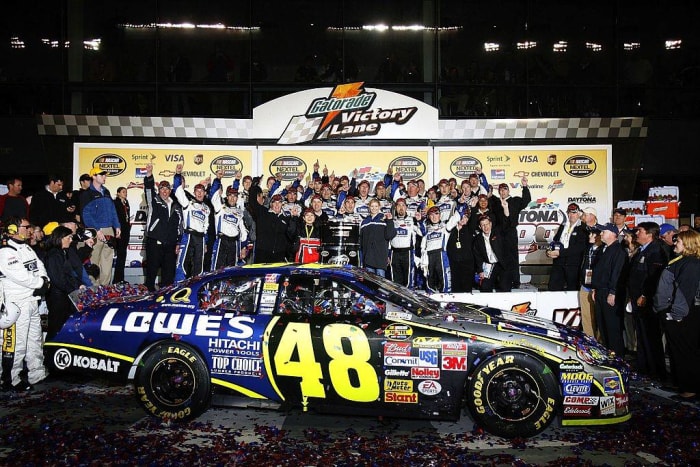
After the 2006 Daytona 500’s 10th caution flag of the day came out with only three laps to go, it extended the race to 203 laps for the second time ever and the second year in a row. When it was all finally over, Jimmie Johnson secured his first Daytona victory well after the sun had already set at the track.
2005: Jeff Gordon
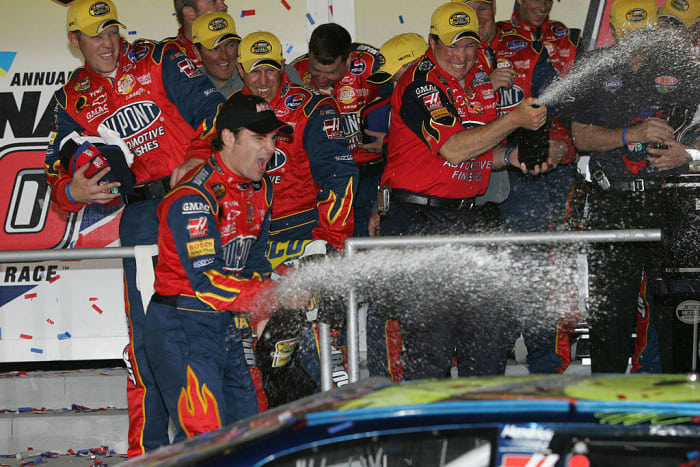
The 2005 Daytona 500 ended its final three laps under caution, so under newly introduced rules, the race was extended to 203 laps — the first time a Daytona race ever went more than 500 miles. The race ended right around sunset with Jeff Gordon in the lead for the driver’s third and final win at the event.
2004: Dale Earnhardt, Jr.
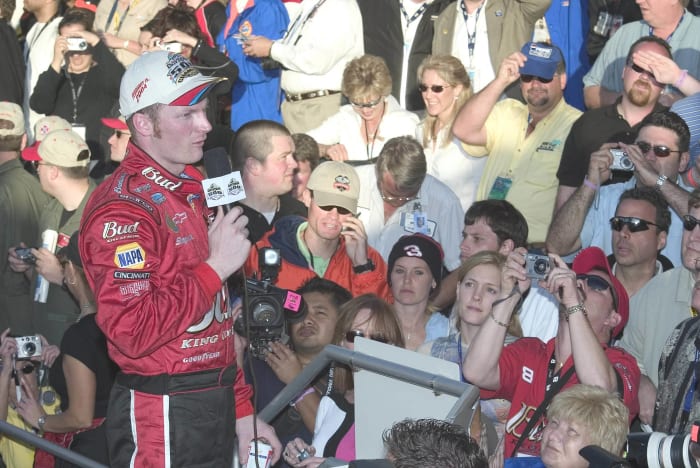
Exactly six years to the day after his father first won at Daytona (and three years after he tragically died), Dale Earnhardt Jr. won the 2004 Daytona 500. Although Tony Stewart led for almost half of the 200 laps, Earnhardt Jr. and his No. 8 Chevy passed him on lap 181 and never looked back.
2003: Michael Waltrip
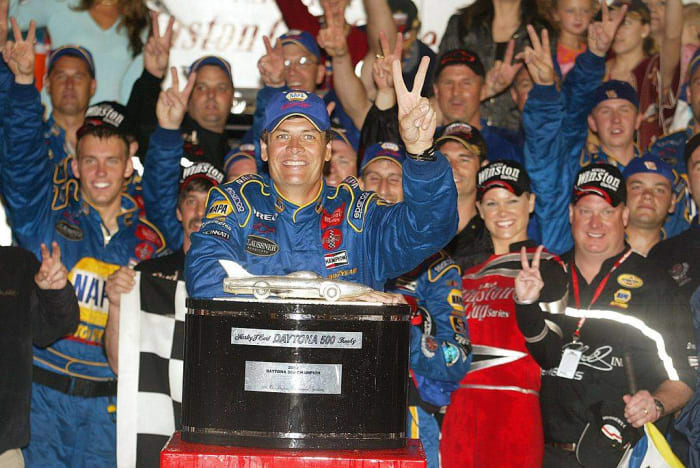
After his previous Daytona victory was overshadowed by Dale Earnhardt’s death, Michael Waltrip earned another chance to celebrate after winning again in 2003. However, it wasn’t a full race, as rain forced the event to be called after only 109 laps, which was the the shortest race in Daytona history and the first time it was shortened since 1966. This was also the year Ryan Newman’s Dodge crashed and flipped end over end numerous times on lap 58, but he somehow managed to walk away under his own power.
2002: Ward Burton
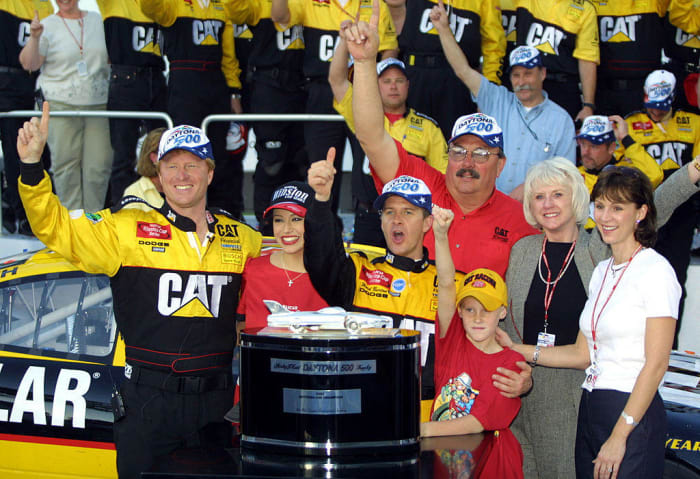
After numerous accidents, incidents and cautions, Ward Burton and Sterling Marlin were left leading the pack as the race approached its conclusion. A red flag then came out, and the race was halted to clean up the track. However, Marlin got out of his stopped car to check on some damage and was sent to the rear of the field as a penalty for working on his car under a red flag. When the race was resumed, Burton cruised to his first Daytona victory, and his Dodge became the first non-Ford or non-Chevy to win the race in 14 years.
2001: Michael Waltrip

Although Michael Waltrip (younger brother of Darrell Waltrip) won the 2001 Daytona 500, the race is mostly remembered for two major crashes. The first occurred on lap 173, eliminated a whopping 18 cars and involved guys like Tony Stewart, Robby Gordon, Jason Leffler and Mark Martin; no one was seriously injured. On the final lap, however, Dale Earnhardt’s No. 3 car was touched on the left rear side, and he momentarily drifted onto the apron. Earnhardt then pulled to the right, causing Ken Schrader to impact him behind the passenger door and Dale slammed straight into the outside wall at more than 155 mph. Earnhardt was rushed to the hospital but tragically died at the age of 49.
2000: Dale Jarrett
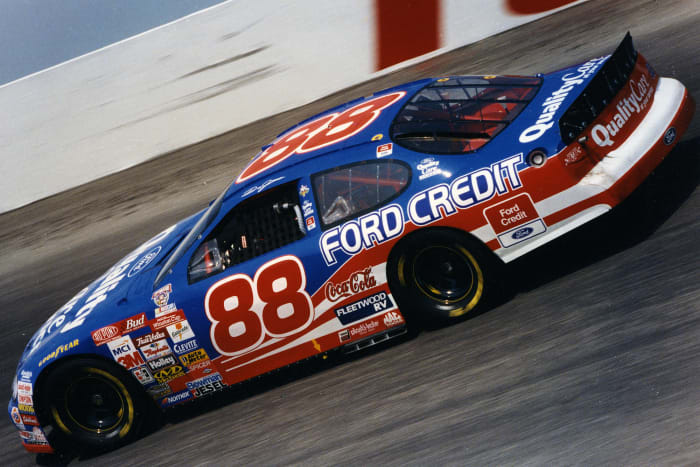
After earning pole position, Dale Jarrett captured his third and final Daytona 500 victory in 2000. However, it wasn’t all smooth sailing (or driving), as 12 percent of the race was held under a caution flag. After Jimmy Spencer hit the front stretch wall with only a lap to go, the caution flag was waved, and Jarrett’s lead was secured. In addition to winning $1,277,975 in prize money, Jarrett also earned the No Bull 5 Million Dollar Bonus.
1999: Jeff Gordon

When Jeff Gordon won his second Daytona 500 in 1999, he did so via a memorable three-wide pass on Rusty Wallace and Mike Skinner with only 10 laps to go, and the daring maneuver almost backfired when Gordon narrowly missed Ricky Rudd’s car as it limped off the track. Earnhardt provided the final push to give Gordon the lead and then tried — but failed — to pass him on the final lap.
1998: Dale Earnhardt
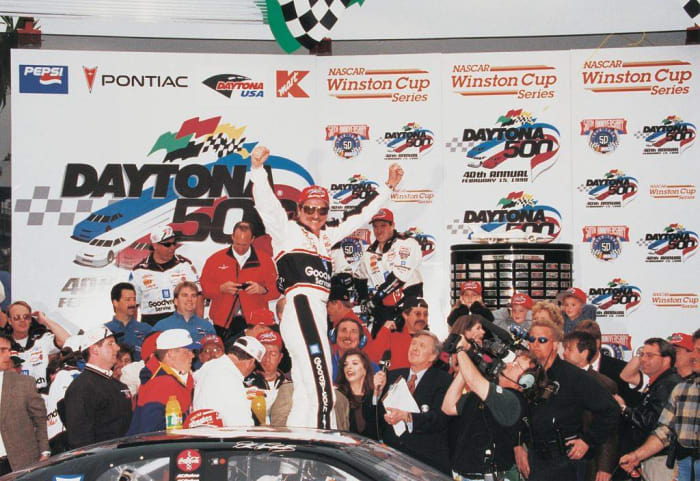
It was a long time coming (19 attempts, to be precise), but 1998 was the year that Dale Earnhardt and his No. 3 car finally won the Daytona 500. The victory also snapped a 59-race winless streak for Earnhardt. All in all, it was a remarkably clean race, with Earnhardt, Bobby Labonte and Jeremy Mayfield vying for first before the Intimidator earned his victory.
1997: Jeff Gordon

Not only was 1997 the first Daytona 500 win for Jeff Gordon, but at age 25, he also became the youngest person to ever win the race. Gordon was behind the wheel of Hendrick Motorsports’ No. 24 Chevrolet when he won, a car and a sight that race fans would get used to seeing a lot over the next two decades.
1996: Dale Jarrett

Dale Earnhardt finally earned pole position prior to the 1996 Daytona 500, leading many to believe he would see his first victory at the event that year. He even opted for only two new tires during his final pit stop to save time. However, Dale Jarrett, on four new tires, managed to catch up to Earnhardt on lap 177 and hold the lead for the remainder of the race to earn his second victory at Daytona.
1995: Sterling Marlin
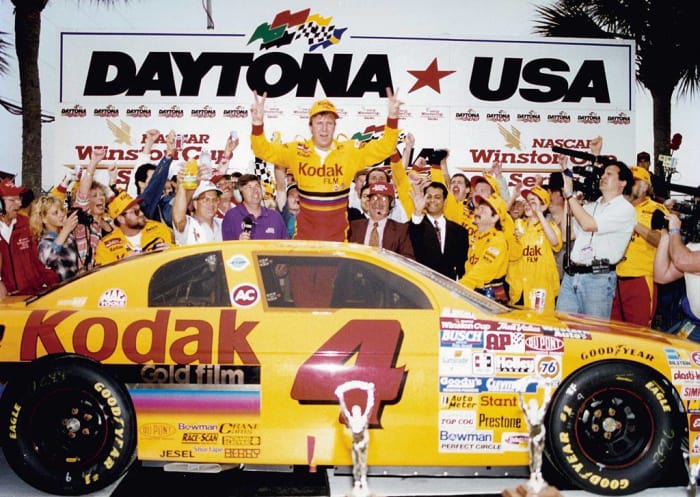
After winning his first Daytona 500 in 1994, Sterling Marlin was so excited to win another that he did so again the following year. It seemed every possible delay was thrown at the other drivers, with Marlin being one of the only racers to avoid any significant setbacks. Marlin was the third driver to ever win back-to-back races at Daytona (after Richard Petty and Cale Yarborough), a feat no one has accomplished since.
1994: Sterling Marlin
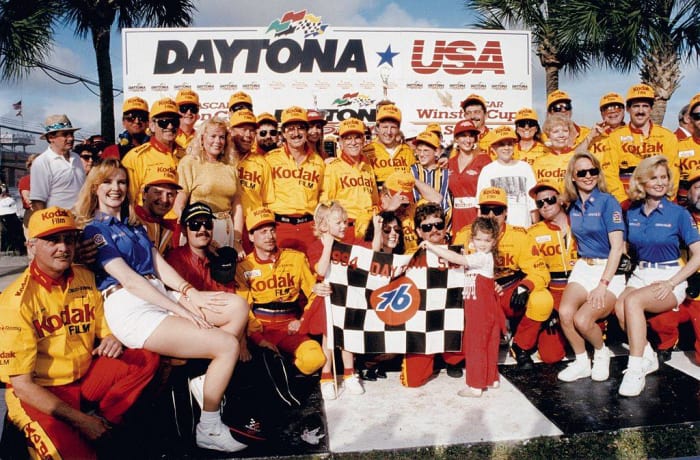
After 279 starts and eight second-place finishes, Sterling Marlin finally nabbed his first Winston Cup win at the 1994 Daytona 500. It took a lot of lead changes and every drop left in Marlin’s tank (he actually ran out of gas with two laps to go), but the fumes managed to carry him to victory. They couldn't carry him to victory circle, however; Marlin needed a push for that. Although the finale was historic, the victory was nevertheless bittersweet, as Neil Bonnett and Rodney Orr were both killed in separate practice races only three days apart in the weeks leading up to the event.
1993: Dale Jarrett
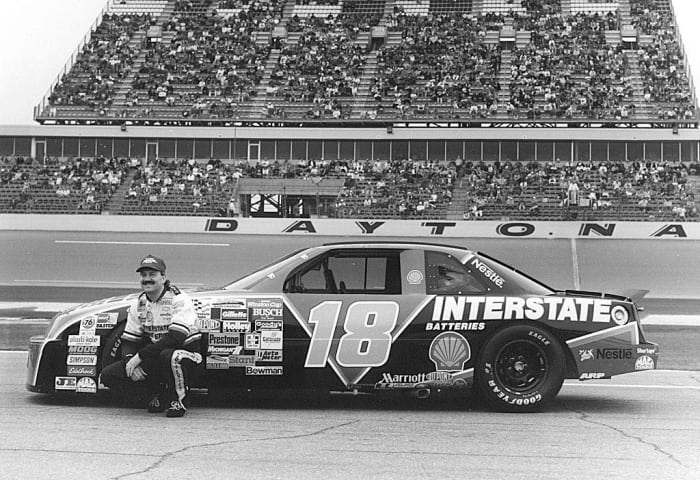
As engine trouble and crashes picked off the competitors one by one (including a terrifying accident that caused Rusty Wallace to violently roll numerous times), Dale Earnhardt emerged to lead the pack, with Dale Jarrett and a rookie named Jeff Gordon hot on his tail. It soon became the Dale and Dale show — as CBS announcer and proud papa Ned Jarrett dubbed the last few moments on live TV — with the younger Jarrett barely nosing ahead for the win. Ned later apologized to Earnhardt for showing bias during his broadcast, and an understanding Earnhardt simply replied, “I’m a daddy too.”
1992: Davey Allison

When Bobby Allison’s son Davey won the 1992 Daytona 500, they became the second father-son duo to win at Daytona (after Lee and Richard Petty, of course). Although the future appeared bright for the new generation of Allisons, tragedy would strike later in '92 when Davey’s son (and Bobby’s brother), racer Clifford Allison, was killed in a practice race for the Detroit Gasket 200 on Aug. 13. And as if the agony couldn’t get worse for the family, Davey died in a helicopter crash at Talladega less than a year later.
1991: Ernie Irvan
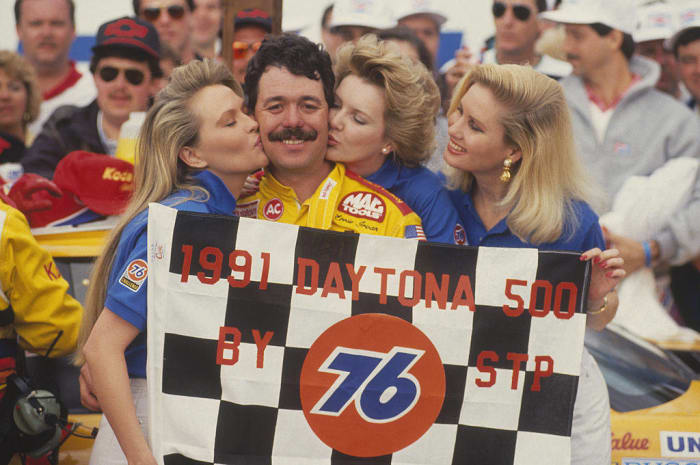
As the 1991 Daytona 500 reached its conclusion, Ernie Irvan passed leader Dale Earnhardt, spurring a heated battle for second place. However, Earnhardt tangled with Davey Allison, causing both cars to spin out and take with them Kyle Petty, who led for the longest out of anyone. This allowed Irvan to cruise to an easy victory down the homestretch. The '91 race was also notable for the absence of A.J. Foyt. Foyt was injured in a crash in the fall of 1990 and missed his first Daytona 500 in 26 years.
1990: Derrike Cope

After leading for 155 laps, it looked like Dale Earnhardt was finally on his way to his first Daytona 500 victory in 1990. However, the racing gods had different plans, and an errant piece of metal bell housing fell off Rick Wilson’s car, was run over by Earnhardt and allowed relatively unknown driver Derrike Cope to secure an upset victory for his first and only career win at Daytona.
1989: Darrell Waltrip
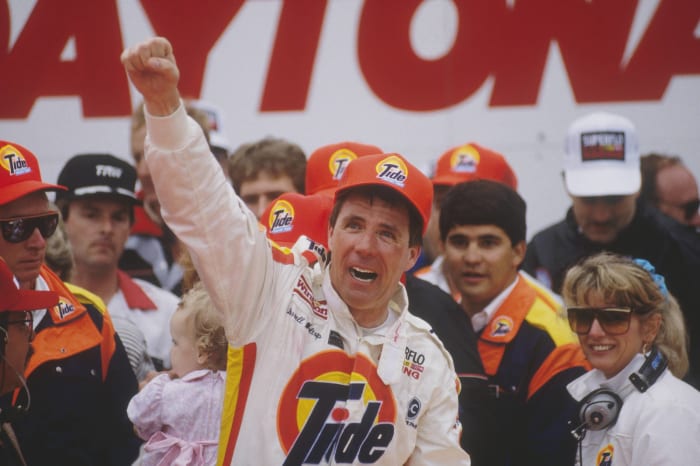
After numerous near misses in previous years, Darrell Waltrip finally won his first Daytona 500 in 1989 despite Ken Schrader earning the pole for the second consecutive year. Waltrip nearly dried up his gas tank after refusing to stop during the race’s final 53 laps, but his Chevy Monte Carlo managed to cross the finish line on fumes, with three other Chevrolets following in the second, third and fourth places. Waltrip was in complete disbelief following the race and even asked reporter Mike Joy, "This is the Daytona 500, isn't it?” while standing in victory circle.
1988: Bobby Allison
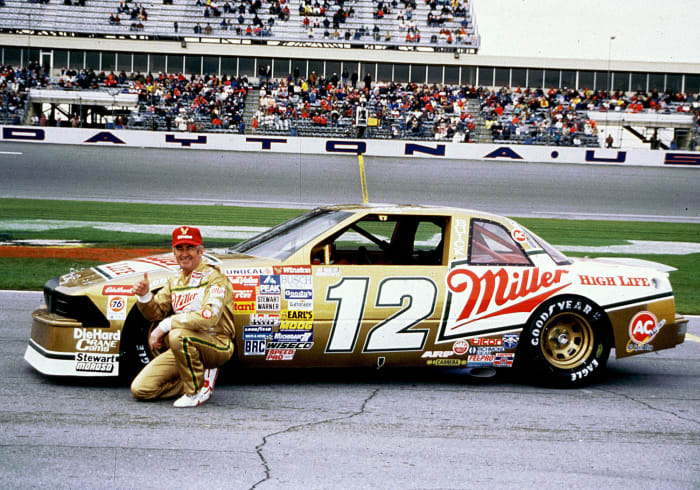
1988 was 50-year-old Bobby Allison’s third and final Daytona 500 win, and the victory made him the oldest racer to ever win the race — a record that stood for more than 25 years. Interestingly, the second-place finisher was Allison’s own son, Davey. (Father and son actually celebrated together in victory circle, although this moment was wiped from Bobby’s memory after a crash the same year at Pocono.) The 1988 Daytona 500 was probably most famous for a crash on lap 106 where Richard Petty was tagged from behind, rolled over eight times and was struck by Brett Bodine. Three other racers were also involved in the wreck, but thankfully everyone walked away unscathed.
1987: Bill Elliott
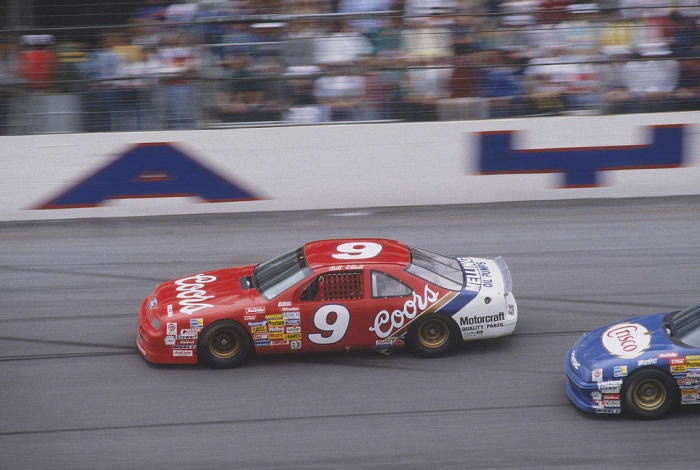
Once again, Bill Elliott earned the pole in 1987, and he wasn’t going to let victory slip away like the previous year. Elliott and his No. 9 Ford led for 104 laps, but it was actually Geoff Bodine who led with three laps to go after skipping a pit stop for fuel. His crew chief, Gary Nelson, said they would either win or run out of fuel trying. Bodine ran out of fuel, and Elliott won the Daytona 500 for the second time in three years.
1986: Geoff Bodine

Bill Elliott won pole position for the second straight year, but a major crash on lap 116 knocked him, Buddy Baker, Neil Bonnett, Cale Yarborough, Kyle Petty and numerous other drivers out of contention or out of the race completely. In the end, it came down to Geoff Bodine and Dale Earnhardt, but Earnhardt had to pit for gas with only three laps to go and blew his engine pulling out, allowing Bodine to win with an 11-second margin of victory.
1985: Bill Elliott

Bill Elliott earned the pole at a then-record speed of 205.114 mph, almost lapped the field in his qualifying race and won the 1985 Daytona 500 after leading for 136 laps. The race was marred with engine trouble throughout, which eliminated previous winners Bobby Allison, A.J. Foyt, Benny Parsons, David Pearson and Cale Yarborough.
1984: Cale Yarborough
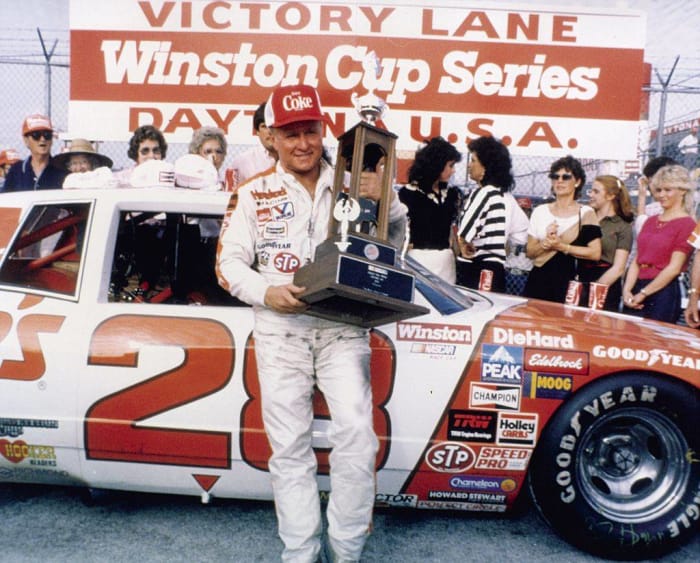
Two years, two wins for Cale Yarborough, who took home his fourth and final Daytona 500 trophy in 1984. Yarborough secured his win by passing Darrell Waltrip on the backstretch of the final lap — the same move that failed and got him into a fight at the 1979 Daytona 500 but also helped him win in '83. Yarborough became the first racer since Fireball Roberts in 1962 to win the pole, his qualifying race and the 500.
1983: Cale Yarborough
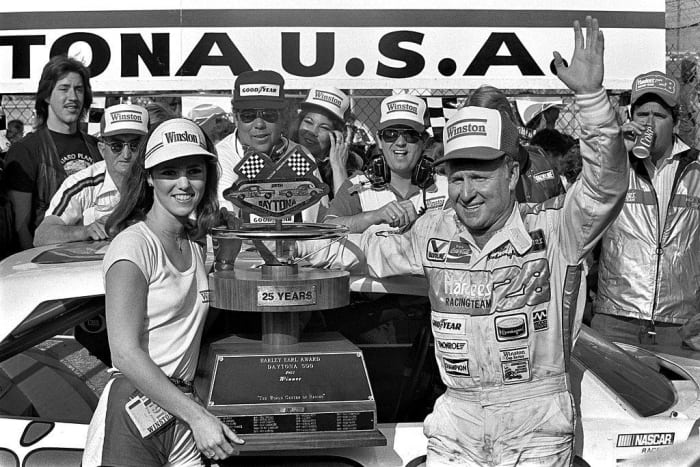
Cale Yarborough’s first Daytona 500 behind the wheel of a Pontiac was also his third win at the track. He actually would have driven a Chevy in the race but flipped and wrecked it in a qualifier after reaching 200 mph. Although Buddy Baker was leading on the final lap of the actual 500, Yarborough managed to cruise past him on the backstretch for the win, with Baker, Joe Ruttman and Bill Elliott competing for a second-place photo finish.
1982: Bobby Allison
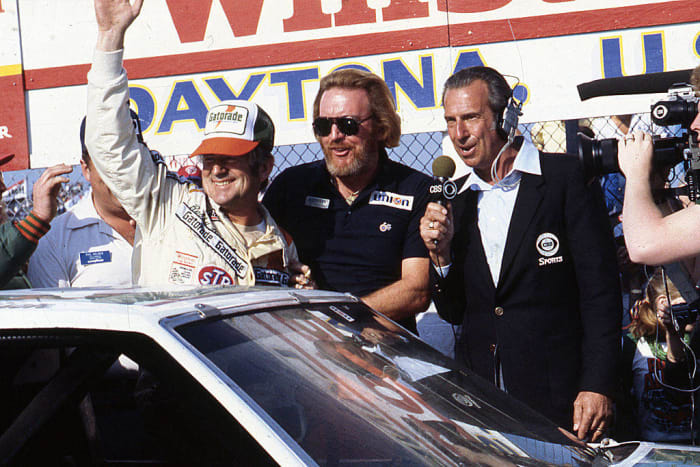
The 1982 Daytona 500 was the second win for Buick as well as Bobby Allison. Allison also set a record for leading the most laps in consecutive Daytona 500s, with 117 in '81 and 147 in '82. The race wasn’t without its controversy, however, as Allison’s rear bumper fell off early in the race, wiped out a solid chunk of the competition and led to a faster car for Allison that beat second-place finisher Cale Yarborough by 23 whole seconds. After the race, Allison’s team was accused of intentionally ditching the bumper.
1981: Richard Petty
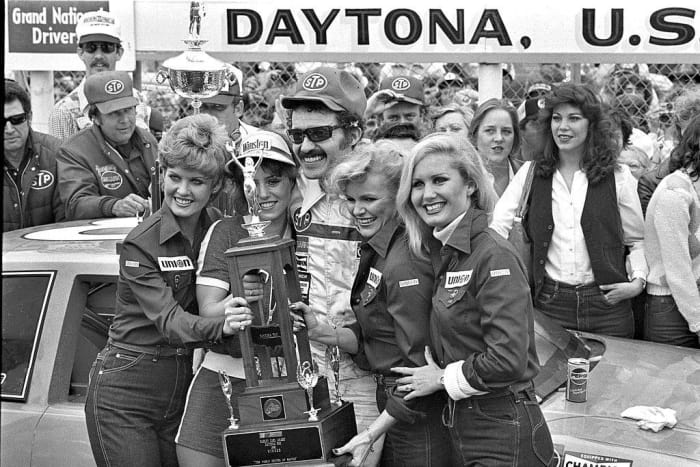
If you’re getting sick of seeing Richard Petty win, you’re in luck. Although Petty won the 1981 Daytona 500, it was his last victory at the track before retiring in 1992. However, this race also involved a first, as Petty was behind the wheel of a Buick, and the brand had never previously won a race at Daytona. It wasn’t easy though, as the fleet of new downsized cars made for a fiercely competitive race that saw 49 lead changes.
1980: Buddy Baker

After his numerous potential victories in previous races were derailed by blown engines, Buddy Baker finally won his first (and only) Daytona 500 in 1980, which was also the second win in a row for Oldsmobile. Sadly, the race also involved some heartbreak, as Ricky Knotts was killed in one of the Twin 125 qualifying races only three days prior.
1979: Richard Petty
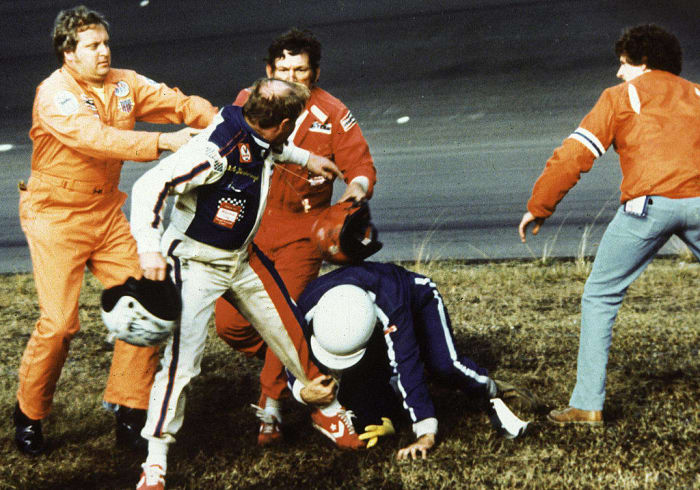
At the time of the 1979 Daytona 500, it had been 20 years since an Oldsmobile won — going all the way back to the inaugural race, to be exact. But put Richard Petty behind the wheel of anything and he’ll win, which is exactly what the champ did for his sixth Daytona victory. However, it’s worth mentioning that Petty really only won after leaders Cale Yarborough and Donnie Allison contacted each other several times and wiped out on the final lap. In fact, during Petty’s Victory Lane celebration, Yarborough famously got into a fist fight with Donnie Allison and his brother, Bobby. Both Cale and Donnie received three-month suspensions.
1978: Bobby Allison
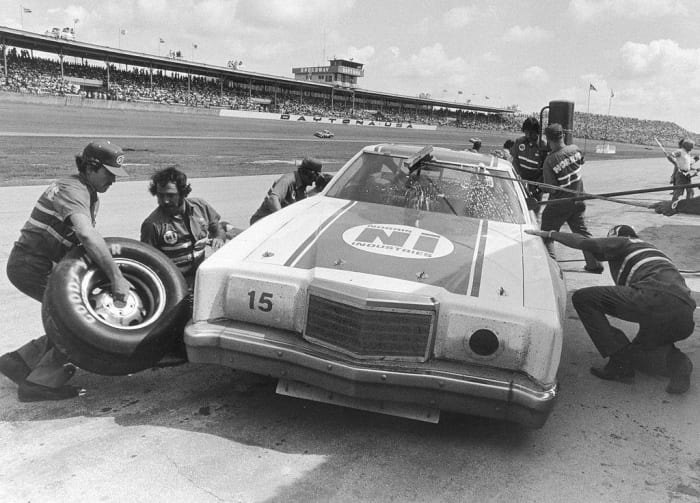
The 1977 Daytona 500 wasn’t kind to Bobby Allison, but 1978’s race made it appear as if divine intervention paved his path to victory. Richard Petty and his brand-new Dodge Magnum cut a tire and blew a huge lead, David Pearson and Darrell Waltrip were both knocked out by Petty, A.J. Foyt flipped in an unrelated accident and Buddy Baker and Cale Yarborough both encountered engine trouble, allowing Allison to take the lead (despite starting in the 33rd spot) and finally end his 67-race winless streak.
1977: Cale Yarborough
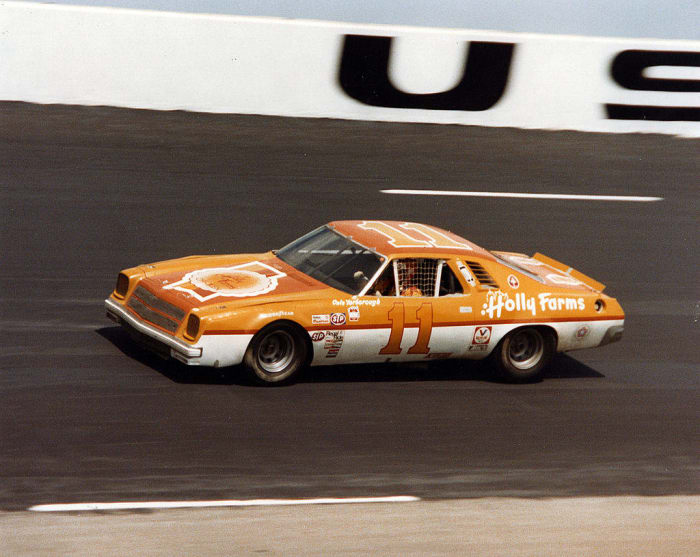
1977 was notable for being the first Daytona 500 to include a female driver, Janet Guthrie, who finished 12th after her engine blew two cylinders with only 10 laps to go. The first-place finisher was Cale Yarborough, who enjoyed his second Daytona victory nine years after winning his first.
1976: David Pearson
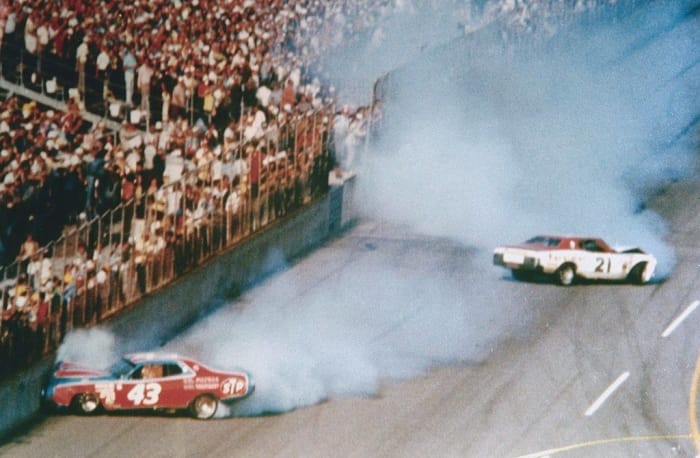
Avenging his last-minute loss from the previous year, David Pearson won the 1976 Daytona 500, but it was no easy feat. Although Pearson led for 76 laps, he had to pass Richard Petty on the last circuit. The two cars contacted each other, and both spun out on the grass just short of the finish line. Petty’s car refused to start, allowing Pearson to limp across the finish line for the victory.
1975: Benny Parsons
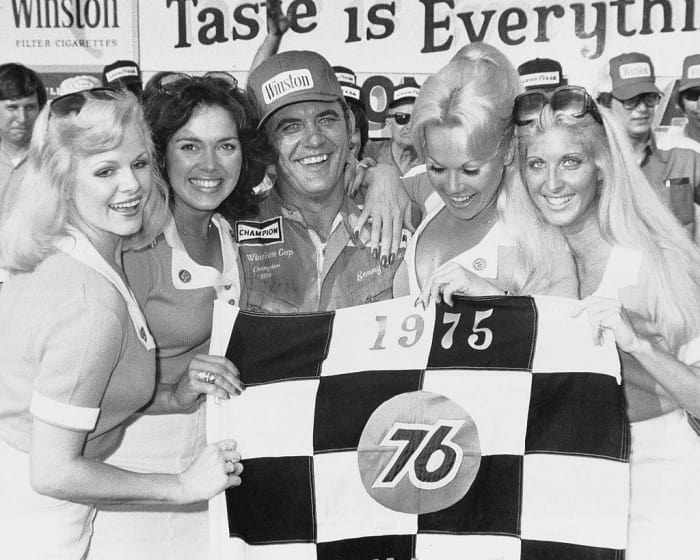
After Junior Johnson’s 1960 Daytona victory, it was a full 15 years before another Chevy won the 500. That occurred in 1975 with a car driven by Benny Parsons, who narrowly avoided a wreck that knocked David Pearson out of first place with only two laps to go. It was a race chock-full of crashes, including a major wreck during the fourth lap that took out nine cars. In the end, only 14 of the initial 40 drivers even managed to finish, with Parsons leading them all.
1974: Richard Petty
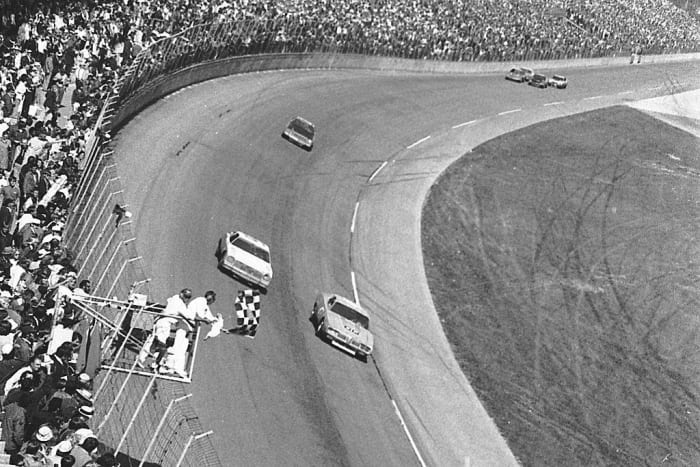
This guy again? That’s right, Richard Petty won his fifth Daytona 500, in 1974, although the race was actually shortened to 180 laps (450 miles) due to the energy crisis, which trimmed down most races by 10 percent. At the time, Petty was the only driver to win back-to-back Daytona 500s, but it didn’t come easy. The '74 Daytona 500 ended up being one of the most competitive in the race’s history, boasting 59 official lead changes.
1973: Richard Petty
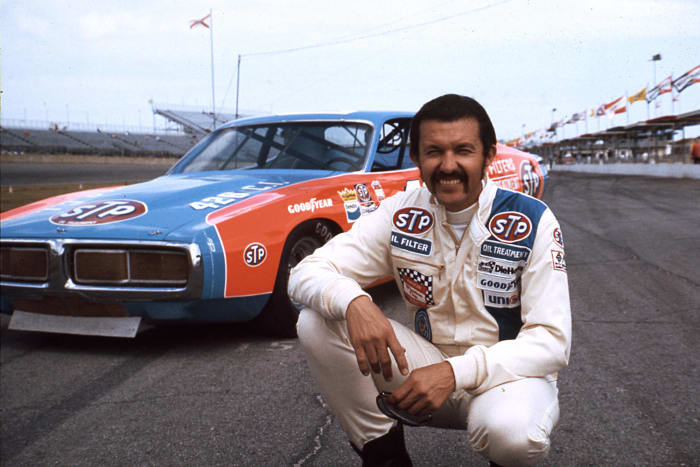
In the end, it wasn’t even close. Although Buddy Baker was widely believed to be the favorite and led for most of the 1973 Daytona 500, his engine blew with only a few laps left, making it an easy win for Petty, who beat second-place finisher Bobby Isaac by a full two laps. Although it was Petty’s fourth Daytona victory, it was his first while driving a Dodge.
1972: A.J. Foyt
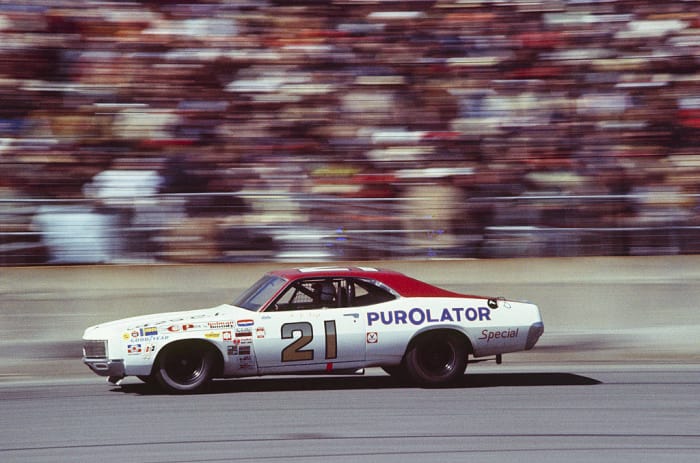
A.J. Foyt doesn’t just hold the records for most USAC wins (159) and Indy Car wins (67), but he’s also the only racer to earn victories at the Indy 500, Daytona 500, 24 Hours of Daytona and 24 Hours of Le Mans. The Daytona win came in 1972 when Foyt beat second-place finisher Charlie Glotzbach by almost two laps.
1971: Richard Petty
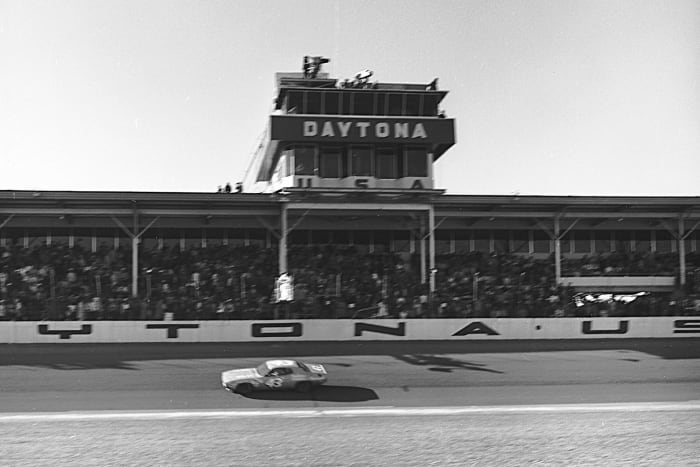
Another Daytona 500, another win for Richard Petty, who led the race for 80 laps in his No. 43 Plymouth. 1971 marked the first Daytona 500 in the Winston Cup era of NASCAR (previous seasons were known as “Grand National”), and Petty went on to become that year’s Winston Cup Champion with 4,435 points.
1970: Pete Hamilton
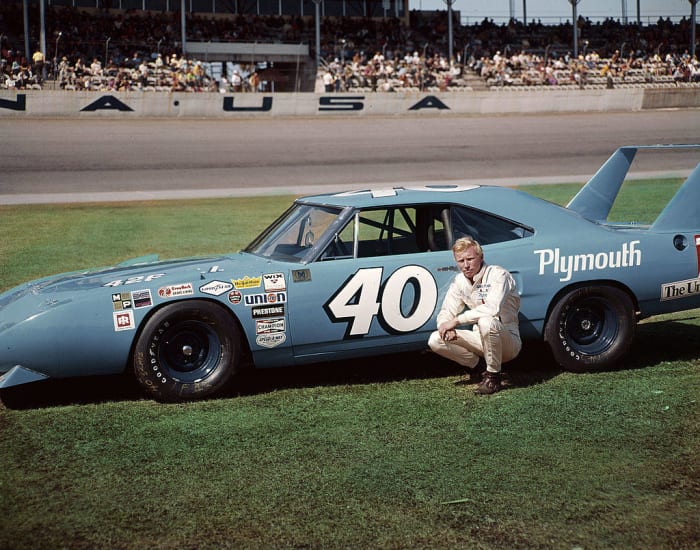
Considered the beginning of NASCAR’s modern era, 1970 was the year that winged Plymouth Superbirds made their debut and the year Pete Hamilton used this very car to drive to victory at Daytona. Hamilton finished just three car lengths ahead of second-place driver David Pearson after passing him with nine laps to go in the race, which was held under a yellow flag 23 percent of the time due mostly to blown engines.
1969: LeeRoy Yarbrough

After narrowly missing his first Daytona victory the previous year, LeeRoy Yarbrough was determined to win in 1969. Although he had to use his backup car after wrecking his primary and trailed by 11 seconds at one point, Yarbrough and his Ford managed to catch and pass Charlie Glotzbach on the race’s last lap for the win.
1968: Cale Yarborough
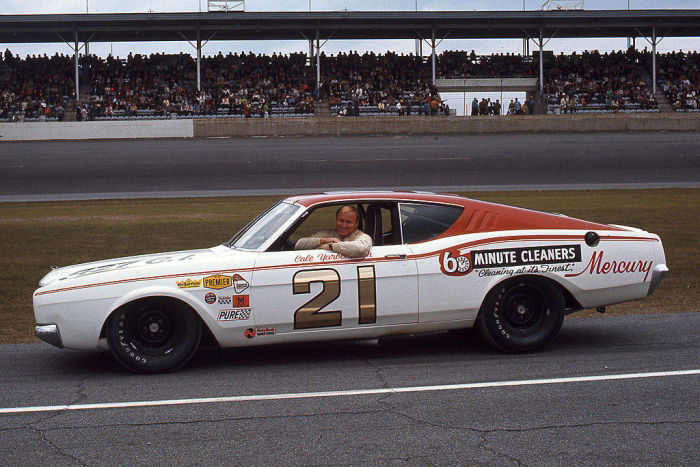
1968 was the first of four Daytona 500 wins for Cale Yarborough and the first of three Daytona 500 wins for Mercury autos. A then-record 11 caution flags delayed the race for 60 laps, but in the end Yarborough squeezed past LeeRoy Yarbrough to win by less than one second. This was the sole Daytona 500 to use qualifying times to set the grid, as the qualifying races were not held in '68 due to weather.
1967: Mario Andretti
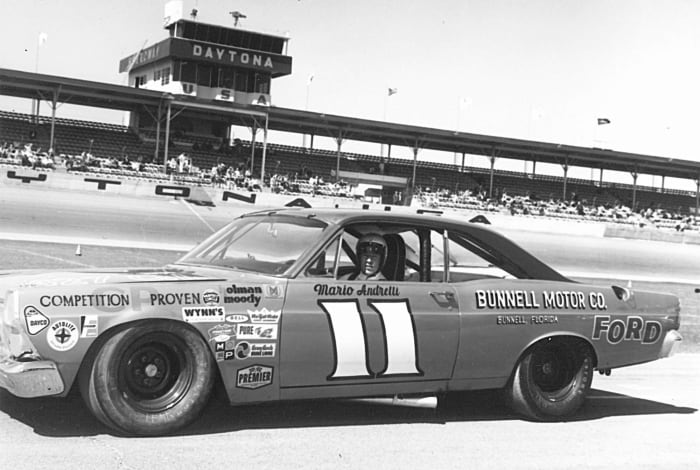
Known better for his open-wheel and USAC racing, Mario Andretti won the Daytona 500 in 1967, the first and only year he participated. To date, Andretti is the only person born outside of the United States to win the event, and at the time, his birthplace was actually listed as Nazareth, Pennsylvania, to avoid backlash.
1966: Richard Petty
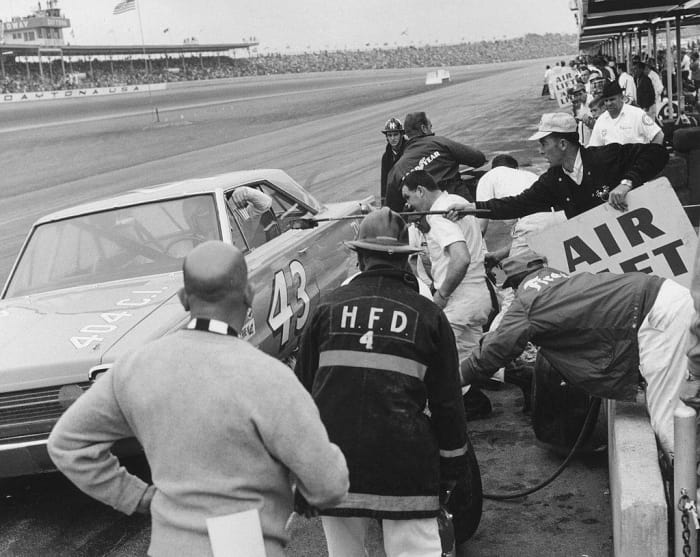
Only two years after his first Daytona win, Richard Petty was back to claim the trophy in 1966. Despite starting with pole position, Petty was behind two laps at one point but eventually finished first after a rain-shortened 198 laps that saw drivers averaging a blistering 160.927 mph. Six drivers shared the lead 15 times throughout the race, but once Petty’s Plymouth took the lead on lap 113, he never looked back.
1965: Fred Lorenzen
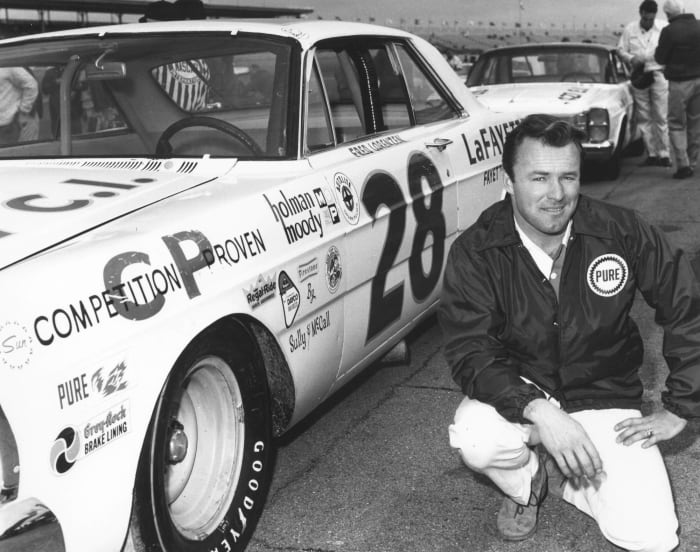
After finishing second to Tiny Lund in 1963, Fred Lorenzen finally got his Daytona 500 victory two years later. Pouring rain shortened the race to only 133 laps, but Lorenzen was leading by a full lap at the time after Marvin Panch (who led the race for 80 laps) previously touched Lorenzen’s Ford and ended up spinning down the backstretch and out of contention during lap 129.
1964: Richard Petty
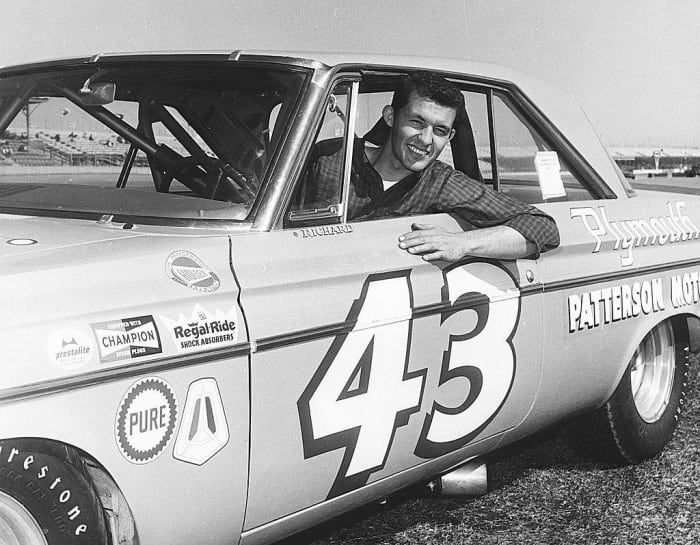
Not to spoil anything, but Richard Petty’s 1964 Daytona 500 victory was not his last at the event, as Petty won a record seven races at Daytona throughout his illustrious career. This one wasn’t even close; Petty and his brand-new 1964 Plymouth led for 184 of Daytona’s 200 laps.
1963: Tiny Lund
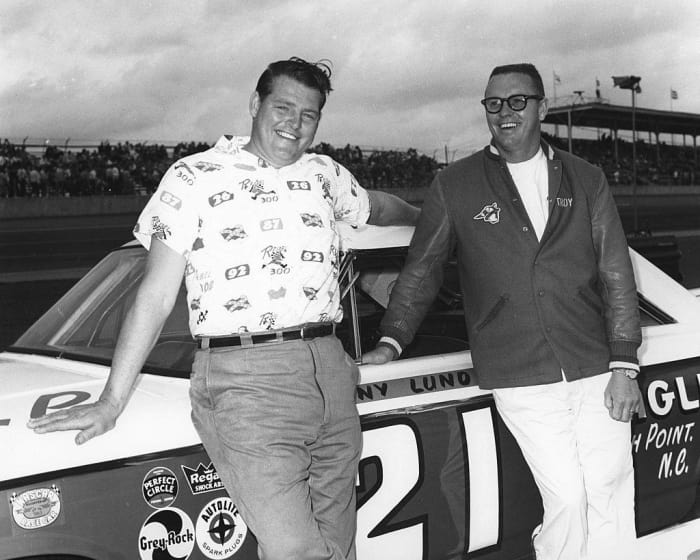
1963 marked the first Daytona 500 win for Tiny Lund and the first for a Ford auto. Tiny (who stood 6-feet-5-inches tall and weighed 270 pounds) was only in the race as a replacement for Marvin Panch, and he benefited from an early weather-related caution that led to his car requiring only four pit stops, while second-place and third-place finishers Fred Lorenzen and Ned Jarrett needed five each.
1962: Fireball Roberts

Fireball Roberts started the 1962 Daytona 500 in pole position and finished first despite five different drivers owning the lead in just the first 50 laps. All in all, however, Roberts’ Pontiac led for 144 of the race’s 200 laps and averaged a record-setting 156.999 miles per hour over the last 40 circuits. This was the first and only Daytona 500 victory for Roberts, who tragically died in a crash two years later at the World 600 in North Carolina.
1961: Marvin Panch
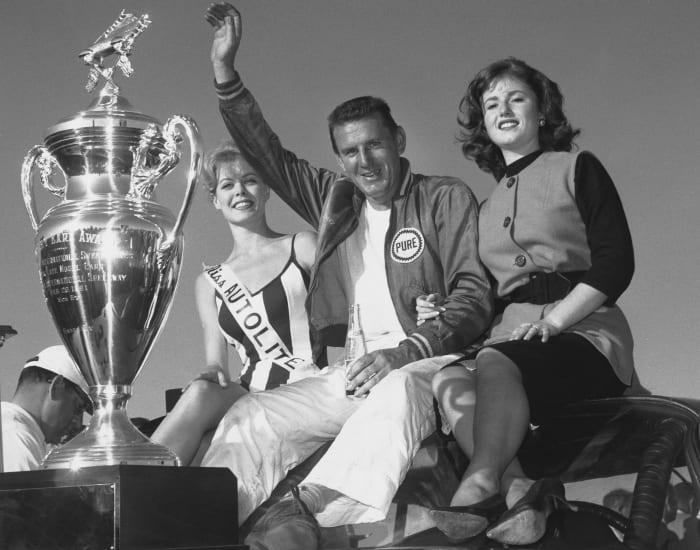
Fireball Roberts was selected to race on behalf of Smokey Yunick’s team, but Roberts suggested Yunick also add another driver, who turned out to be Marvin Panch. Panch’s Pontiac eventually took the lead with 13 laps remaining and held it the rest of the way, winning a full 16 seconds ahead of second-place finisher Joe Weatherly. The 1961 Daytona 500 also earned the unfortunate distinction of owning the event’s first-ever fatality when Harold Haberling’s 1955 Chevy flipped on turn 3.
1960: Junior Johnson
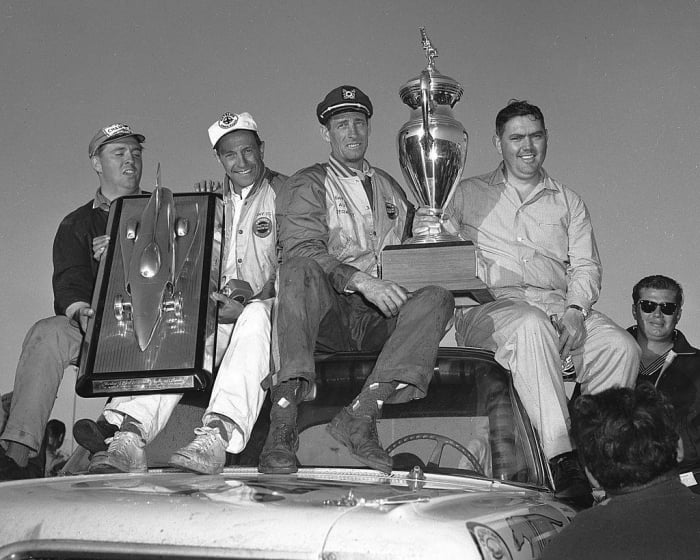
Junior Johnson began the second Daytona 500 in the ninth position and didn’t secure his final lead until there were nine laps left, after Bobby Johns spun out. In addition to being historically significant as the first televised NASCAR event, the average speed of 124.74 miles per hour also made it the slowest race in Daytona history. Johnson, later dubbed “The Last American Hero” and credited as the first NASCAR driver to use the drafting technique, won a total of 50 races in his 12-year career.
1959: Lee Petty
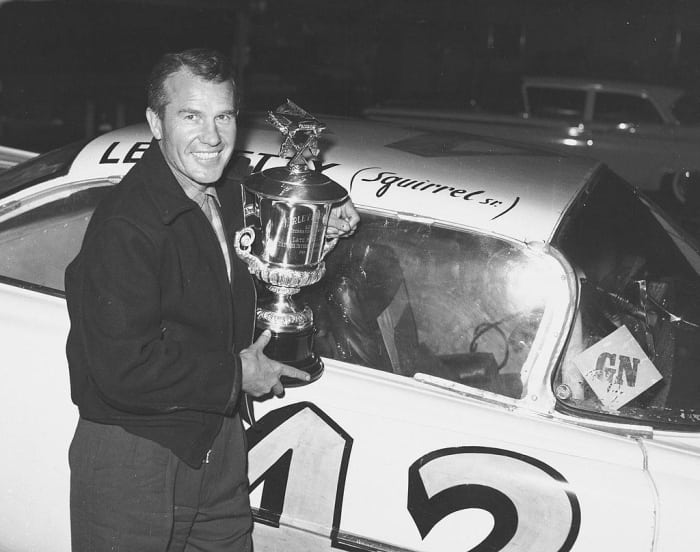
Then called “The 1959 First Annual 500 Mile NASCAR International Sweepstakes at Daytona,” the race was held at the newly opened Daytona International Speedway, which was built especially for the event. Interestingly, 20 of the 59 participating cars were of the convertible variety, and there were also no caution periods, making it one of the few “perfect” races in NASCAR history. In the end, it was a photo finish between Lee Petty (father of driver Richard Petty, grandfather of Kyle Petty) and Johnny Beauchamp, with Petty not being declared the official winner until three days after the race had concluded.
Matt Sulem has been writing and editing professionally for more than a decade. He has worked for BubbleBlabber, The Sportster, and The Daily Meal, among other publications, but has called Yardbarker home since 2006. Matt’s writing combines a love for nostalgia with a passion for promulgating interesting, informative, and lesser-known facts about pop culture
More must-reads:
- Championship-winning NASCAR crew chief lands new role for 2026 season
- If Eli Manning makes the HOF, Russell Wilson has to join him
- The 'Active NFL passing YPG leaders' quiz
Breaking News
Trending News
Customize Your Newsletter
 +
+
Get the latest news and rumors, customized to your favorite sports and teams. Emailed daily. Always free!
PRIVACY POLICY EDITORIAL POLICY CONTACT US
ABOUT YARDBARKER TERMS OF SERVICE
Use of this website (including any and all parts and
components) constitutes your acceptance of these
Terms of Service and Privacy Policy.
This site is for entertainment purposes only.
There is no gambling offered on this site.
Gambling Problem? Call 1-800-Gambler.

